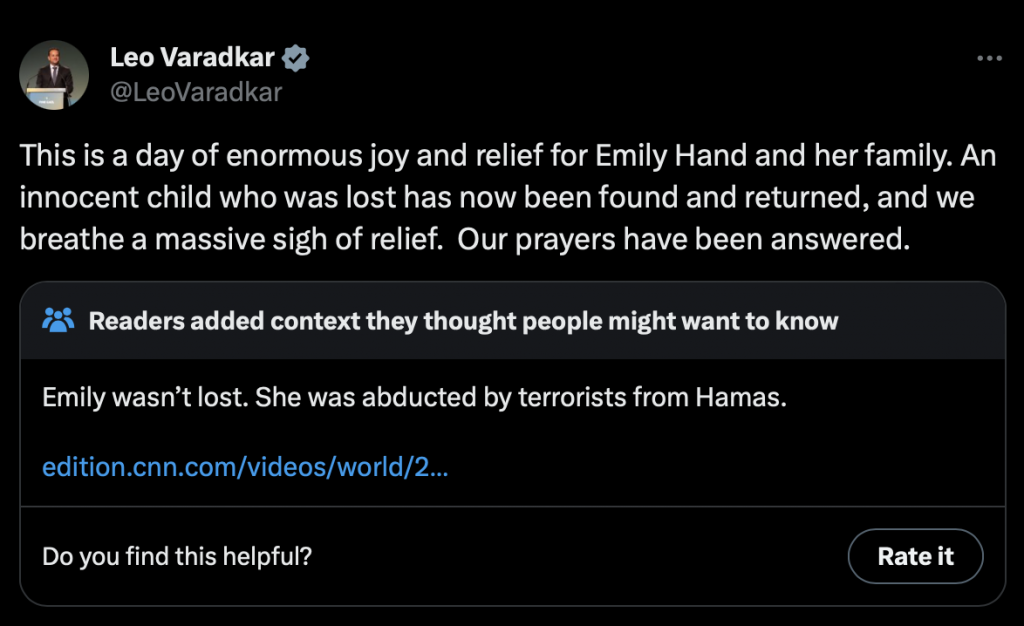Some weeks ago I wrote a short article about comments from Tánaiste Micheál Martin, on the present conflict between Israel and Hamas. I thought it was false and counter-productive for Mr Martin to respond to the ongoing religiously-inspired conflict, by portraying the Jewish faith as vengeful in contrast to a more compassionate Christianity. This is not an accurate picture of the comparative teachings within those two Abrahamic faiths, and it is not appropriate either for Irish politicians to conduct international diplomacy by promoting their own religiosity. More recently, Taoiseach Leo Varadkar has added some more Christian chauvinism to the Irish commentary on the ongoing crisis.
Below is illustrated the Leo Varadkar tweet that created international headlines and caused a diplomatic furore:

Most of the outrage in relation to this tweet has highlighted the contrast between losing and finding a child (as a parent might momentarily do in say a supermarket) as compared to the violent kidnapping of a child by murderous and genocidal terrorists. For example, the Israeli Foreign Minister stated that Leo Varadkar had lost his “moral compass”, before summoning the Irish Ambassador. The suggestion has been that Ireland is indifferent to the atrocities that have been committed by Hamas.
I disagree. I don’t believe that Leo Varadkar was trying to minimise the horror of what Hamas did, by pretending that a child who had been violently abducted by despicable terrorists had merely been “lost”. Rather, I think that this tweet attempted to offer an allusion to Christian scripture, in the same way that that the hymn Amazing Grace does. The explicitly religious nature of Leo Varadkar’s message is further emphasised by his statement that “our prayers have been answered”.
Just like the statement in the Dáil by Micheàl Martin, this is entirely inappropriate Christian chauvinism in response to a religiously-inspired conflict, which has itself been perpetuated in large part by sectarian bigotries. Leo Varadkar’s statement is also utterly absurd on its face. To see this, we need only think for a moment about what it would mean if Emily Hand had been indeed been freed due to the divine intervention that was solicited in “our prayers”. For example, one clear implication would be that “our prayers” are more effective than the those of the many Israelis who have not found a similarly positive outcome following these events.
Moreover since Leo Varadkar was raised as a Roman Catholic, many will have interpreted his tweet as implying that the Roman Catholic god had arranged for the release of Emily Hand in response to prayers from the predominantly Roman Catholic country he speaks for. This would mean that the same purportedly omnipotent god permitted the rape and slaughter of hundreds of innocent Jews during the same events. Any god that would save Emily Hand but not intervene to save the other murdered and still-captive victims, is not worth worshipping. That god would be complicit in the horrors visited upon so many children by Hamas on October 7th 2023. Furthermore, whereas we are often told by Roman Catholics that their god permits such evil because it is so important for humanity to retain free will, this argument would not have permitted suspending the free will of Hamas terrorists in order to ensure their release of Emily Hand.
However, perhaps Leo Varadkar was not referring only to Roman Catholic prayers? Maybe he was referring to prayers from the entire Irish nation, to include those of other faiths such as the Hinduism of his father? It would be even more absurd to suggest that divine intervention was arranged through intercessionary prayer directed at a pantheon of mutually exclusive deities. In fact, we know that even Leo Varadkar does not find any of this in the least credible, since he himself is not religious. In that context, the unctuous religiosity of Leo Varadkar’s tweet just seems thoroughly cynical and entirely disingenuous.
Leo Varadkar does not himself believe that “our prayers were answered”, and yet he was willing to issue a statement to this effect, which incorporated other allusions to the utility of Christianity. The Roman Catholic majority in Ireland are entitled to be highly offended by such mendacious pandering, whereby their Taoiseach dishonestly pretends to validate the efficacy of their propitiations. In fact, all Irish citizens can be incredibly disappointed that so much of our recent international diplomacy has sought to address a religious conflict by promoting Christianity instead. Given the history on this island, Irish politicians should have figured out by now that all sectarian chauvinism is unjustifiable, and more likely to inflame relations than improve them.